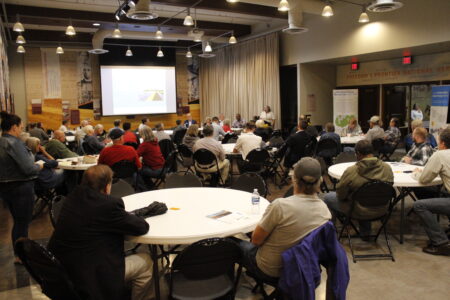Proposed 3,000-acre solar project in Douglas and Johnson counties hopes to be generating power by 2026

photo by: Austin Hornbostel/Journal-World
A couple dozen people attended an informational meeting about Florida-based NextEra Energy Resources' West Gardner Solar project Tuesday, May 9, 2023 in Lawrence.
Despite some public pushback, permitting issues and a set of county regulations that its attorney says are too strict, a Florida-based company says it hopes to have its 3,000-acre solar project in Douglas and Johnson counties up and running by 2026.
That was the message at an informational meeting Tuesday night hosted by Florida-based NextEra Energy Resources, the company behind the proposed West Gardner Solar project. The project, which would take up 1,000 acres of southeastern Douglas County and part of southwestern Johnson County, has been years in the making, but Tuesday was the first time that NextEra officials had hosted a public meeting and shared specifics about their expected timeline.
Billy Wilkins, the project’s director, told the roughly 25 meeting attendees that the company had already signed land use agreements for about 2,500 acres across both counties — about 900 of those acres being in Douglas County. But it won’t just take permission from landowners to get the project off the ground — it will also take the county’s permission, and Wilkins had an idea of how long that might take.
“We’re optimistic about making it through the permitting process in both counties sometime this year or maybe early next year, and ultimately building the project in 2025 with commercial operation (beginning) in 2026,” Wilkins said. “It’s about a 14- to 16-month construction timeline; it’s a pretty long construction timeline, so that’s why construction would start probably mid- to late 2025.”
Even in the early planning stages, the project has already gotten some opposition from residents in Douglas County, and permitting issues have been one source of recent controversy. In 2022, residents complained that NextEra and engineering consulting firm Terracon conducted testing activities that involved driving metal beams into the ground in Douglas County as late as 10:30 p.m. without getting permission from the county first. That activity ceased after the county found out about it, and one county commissioner, Patrick Kelly, told representatives with NextEra in March that the testing “created a rift in the community, and the community doesn’t trust you.” NextEra has applied for a permit to continue the testing, and that’s next scheduled to appear on a County Commission agenda in late June.
Wilkins on Tuesday said that the issues wouldn’t happen again as the company went through the permitting process, and he reiterated what the company’s officials told the County Commission earlier this year: that NextEra wasn’t aware it had to apply for the permits in the first place.

photo by: Austin Hornbostel/Journal-World
Billy Wilkins, the project director for the West Gardner Solar project, speaks during NextEra Energy Resources’ Tuesday, May 9, 2023 informational meeting.
Not all speakers at the meeting were as patient with the permitting process. Alan Anderson, an attorney with Kansas City’s Polsinelli Law Firm, which represents NextEra, said Douglas County’s solar regulations were too strict for developers — and possibly the most stringent regulations in the state.
“If every county in Kansas did what Douglas County did, it would pretty much cripple the solar industry,” Anderson said.
Anderson has been telling Lawrence-Douglas County planning commissioners as much since 2021, when they were still working to develop the county’s regulations for solar projects. As the Journal-World previously reported, in one such instance he told the Planning Commission that Douglas County can’t have anything resembling its now-codified 1,000-acre cap on the size of solar projects if it wants to “place itself in a position of climate change leadership.” In the years since, county leaders repeatedly pushed back against laxer regulations, often in the interest of preserving agricultural land. The county has expressed some interest in exploring agrivoltaics, the simultaneous use of land for solar power generation and agriculture, and Wilkins said Tuesday that NextEra was interested in that land use, as well.
If the project moves forward as expected, Wilkins said that Evergy had indicated some desire to purchase it once it was operational, but there wasn’t a specific buyer lined up yet for the energy that it would produce. If Evergy were to purchase the project, NextEra would develop and construct it, Evergy would own it, and, presumably, the energy the project generated would go to Evergy customers. But other NextEra projects — like its High Banks wind project in Republic County, which is the highest-capacity wind facility in the state — have had purchasers like Google or other tech companies.
NextEra has hosted a website for the West Gardner Solar project for a few years, but it’s only shown a general project area and touted an anticipated capacity to generate up to 320 megawatts of renewable energy, enough to power roughly 40,000 homes. Other details on the site are more general, in line with the other information NextEra shared with folks in Douglas County Tuesday.
Not all of the presenters at the meeting were from NextEra; Christopher Ollson, an environmental health scientist, and Donna Ginther, the director of the University of Kansas’ Institute for Policy and Social Research, spoke briefly about the environmental and economic effects of solar farms, respectively. There was also a short question-and-answer session where members of the public submitted questions on notecards.
Wilkins said NextEra is planning more information sessions in both Douglas and Johnson counties in the next month or so.
“We want to do more engagement with residents in the project area to discuss things like buffering and vegetative screening, and then ultimately prove that we’re a partner that looks to do the right thing and build trust with Douglas County,” Wilkins said.







